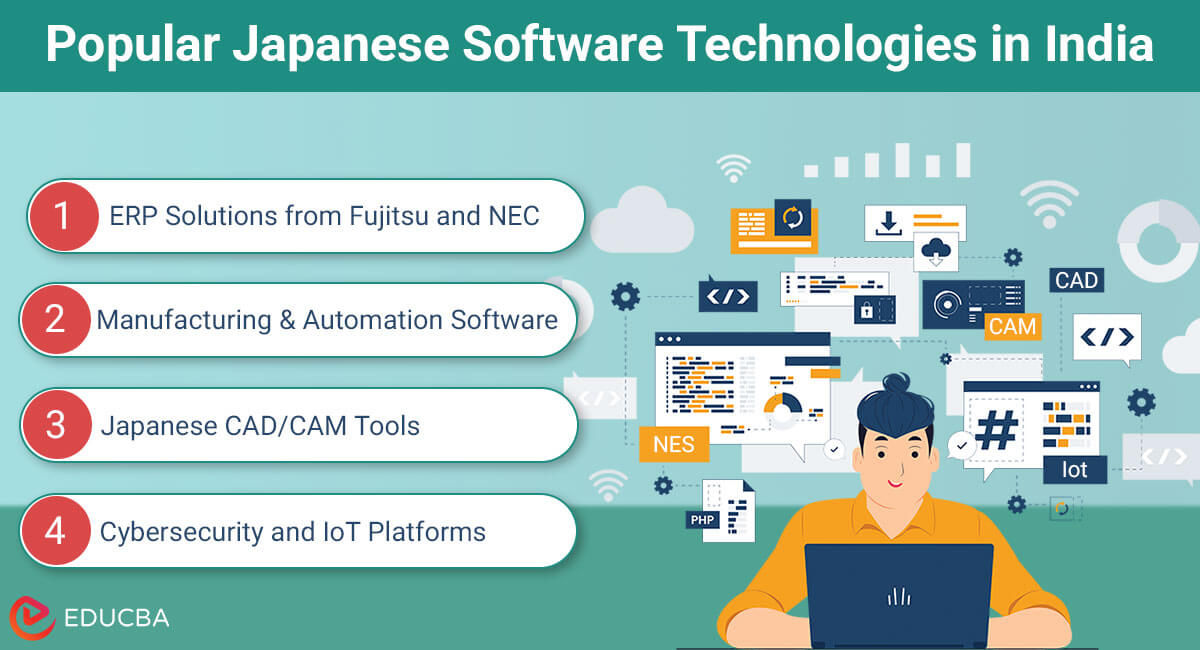
Introduction
India and Japan share a dynamic and evolving relationship in the field of technology. While Indian IT companies have long been known for their software development capabilities, Japanese software technologies have also been gaining popularity in India—especially in sectors such as manufacturing, automotive, robotics, and enterprise solutions.
Japan, known for its precision, innovation, and discipline in technology, has developed several software systems that are now being adopted in India for their reliability, efficiency, and unique capabilities.
Popular Japanese Software Technologies in India
Here’s a look at the key Japanese software technologies making an impact in India:
1. ERP Solutions from Fujitsu and NEC
Fujitsu and NEC are two of Japan’s largest IT and electronics companies that have made significant inroads into the Indian market. Their ERP (Enterprise Resource Planning) systems are widely used by Indian manufacturing companies, especially those in the automobile and electronics sectors, to streamline operations, manage resources, and improve supply chain management. These systems are praised for their security, customization, and compatibility with Japanese industrial standards, making them ideal for Japanese subsidiaries and joint ventures in India.
2. Manufacturing & Automation Software
Japanese software technologies that focus on manufacturing automation—such as SCADA (Supervisory Control and Data Acquisition) and MES (Manufacturing Execution Systems)—are popular among Indian factories, especially in the automotive and electronics industries.
Indian industrial units use robotics software and control systems provided by companies like Mitsubishi Electric, Yaskawa, and Fanuc for precision engineering, robotics control, and real-time monitoring.
3. Japanese CAD/CAM Tools
Mechanical and product design engineers in India widely use Japan’s Computer-Aided Design (CAD) and Computer-Aided Manufacturing (CAM) tools. Manufacturing projects and R&D centers often implement solutions from DMG Mori, Mazak, and Hitachi, valuing them for their engineering accuracy. Cities like Pune, Bangalore, and Chennai, with their well-established industrial and design engineering ecosystems, particularly favor these software tools.
4. Rakuten’s Cloud and E-Commerce Platforms
Rakuten, a leading tech giant from Japan, has strengthened its footprint in India by focusing on cutting-edge cloud services, innovative fintech solutions, and dynamic e-commerce platforms. Rakuten India operates as a major development center, working on AI, cloud computing, mobile applications, and big data solutions. Startups and companies in India, along with their internal teams, actively use their technologies to access scalable, secure, and globally competitive digital platforms.
5. Cybersecurity and IoT Platforms
Japanese cybersecurity firms such as Trend Micro have made a strong impact in the Indian IT space. Enterprises and data centers across India use its advanced threat detection and cloud security platforms. Indian manufacturers and infrastructure firms are increasingly adopting Japanese IoT (Internet of Things) solutions that focus on smart factories, predictive maintenance, and energy monitoring.
6. Language Processing and Translation Tools
With more Indo-Japan business collaborations, demand has grown for Japanese-to-English and Japanese-to-Indian-language translation tools. Japanese companies like Kuroiwa, Kokono, and other NLP (Natural Language Processing) startups introduced AI-based translation software, and Indian companies are now using it to handle Japanese documentation, manuals, and training content.
7. Educational and EdTech Platforms
Japanese e-learning technologies centered around mathematics, robotics, and logical reasoning are slowly gaining popularity in Indian schools and EdTech companies. These tools prioritize discipline, precision, and interactive, gamified learning, perfectly complementing India’s growing emphasis on STEM education. Moreover, many professionals and students are now enrolling in online Japanese language classes to enhance communication and job readiness for roles involving Japanese technologies and collaborations.
Conclusion
Japanese software technologies are quietly but steadily influencing the Indian tech and industrial landscape. Their focus on quality, innovation, and reliability aligns well with India’s digital growth and manufacturing ambitions. As both nations continue to deepen their collaboration, we can expect an even greater exchange of tools, talent, and technological advancements—creating a fusion of Japanese precision and Indian innovation.
Recommended Articles
We hope this guide on Japanese Software Technologies has provided valuable insights into their influence on India’s tech and industrial sectors. For more perspectives on global tech trends, cross-country collaborations, and innovative software solutions, check out these recommended reads:
